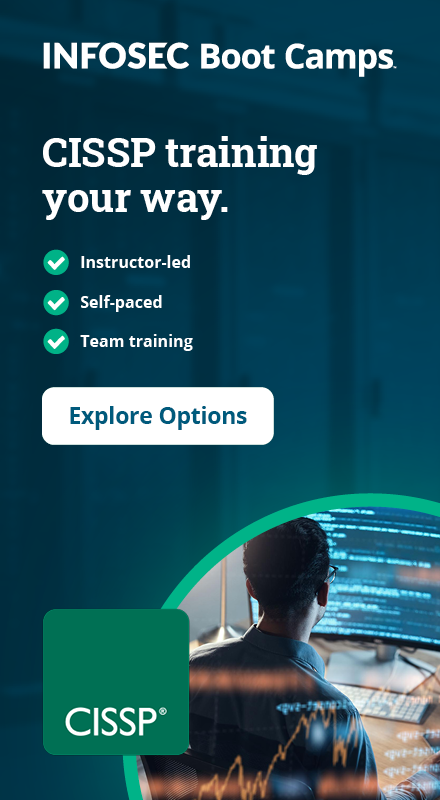CISSP jobs in 2025: Cybersecurity manager outlook and career opportunities
The Certified Information Systems Security Professional (CISSP) from ISC2 is one of the most respected and in-demand cybersecurity credentials available. Businesses and organizations often struggle to find staff with the skills and knowledge needed to design, implement and manage security programs that assure the protection of information assets.
The CISSP certification is often one of the features employers look for in job candidates. In fact, it is the most requested certification in U.S. job openings. That’s largely because it covers a broad range of domains, including
- Security and Risk Management
- Asset Security
- Security Architecture and Engineering
- Communication and Network Security
- Identity and Access Management (IAM)
- Security Assessment and Testing
- Security Operations
- Software Development Security
If you're preparing for your CISSP, we made a free, one-hour CISSP exam tips course and ebook with an Infosec Institute instructor whose students have a 95% pass rate.
Does CISSP help me get a job?
In a competitive job market, demonstrating these skills sets you apart from others applying for the same positions because they show you have a comprehensive understanding of how to design security systems and manage a cybersecurity program. For this reason, many jobs require CISSP.
The CISSP is one of the most requested certifications in U.S. job openings, with Cyberseek.org reporting that 70,082 jobs specifically ask for this qualification.
Jobs that require CISSP
There’s no shortage of CISSP certification jobs on the market. Some of these include:
- Security manager: A security manager leads security teams and designs policies for the entire organization.
- Chief information security officer (CISO): A CISO is an executive that oversees an organization’s cybersecurity program.
- Security analyst: As a security analyst, you monitor networks for threats and respond to them, often organizing team members around a central set of threat response policies.
- Security architect: A security architect designs security systems, ensuring they integrate with an organization’s IT infrastructure.
- Senior information security risk officer: As a security risk officer, you assess the risks presented by a network and design systems meant to reduce risk and increase safety. This position may also involve interfacing with the rest of the risk management team.
- Lead security consultant: As a lead security consultant, you manage a team of consultants that organizations bring in to assess the cybersecurity strength of an organization and tell them how to improve their protections.
Earn your CISSP, guaranteed!

CISSP DoD 8140 Work Roles
The CISSP certification’s content and domains directly align with the Department of Defense (DoD) 8140 directive. This segments cybersecurity positions into distinct roles and provides qualifications for each role. Each of the roles gets categorized under five more general work categories:
- IT (Cyberspace)
- Cybersecurity
- Cyberspace Effects
- Cyberspace Enablers
- Software
Each of these categories has specific work roles associated with them. For example, the category of Cyberspace Enablers includes actions to support acquisition, leadership, legal/law enforcement, and training and education. The list of work roles may be a good starting point as you search for CISSP certification job opportunities.
Read our article on the CISSP and DoD 8140 for more information.
Building on your CISSP
While there are a number of CISSP jobs, only a few certifications can help you land your ideal position. To this end, the ISC2 offers the ISSAP, ISSEP and ISSMP. These used to be CISSP specializations. However, now they are standalone certifications, which means you can earn them without having to get your CISSP first.
Their standalone status makes them a good fit for professionals who want to differentiate their skillset into a more narrow category, specifically security architecture, engineering or management.
To further build on your CISSP, you can pair it with other certifications, too. For example, you can get your CISM, which the Information Systems Audi and Control (ISACA) offers. ISACA also provides the CRISC cert, certifying your risk management qualifications.
CompTIA, another certifying body, also offers SecurityX, which applicants use to qualify for technical roles.
For some applicants, the most logical way to decide which certifications to earn is to check each CISSP job description they come across. The list of job duties may include more specific tasks, such as architecting security systems or engineering solutions, which may inspire you to earn one or more certifications.
CISSP jobs salary
Cybersecurity management jobs often come with a handsome salary, primarily because your expertise brings tangible value to the organization. As outlined in our salary article, the average total compensation for cybersecurity management jobs is $175,583. You can check it out to get a more detailed breakdown of security roles, salaries and different factors that influence how much you earn.
You can also refer to our Cybersecurity salary guide to learn about how to boost your salary, top-earning roles and how much you can earn in an entry-level position.
Keep in mind these are merely averages. Your pay can change quite a bit depending on where you live and the company that hires you. For example, a CISO with a CISSP certification based in San Francisco is likely to make more than a mid-level security engineer or security analyst who lives in the Midwest.
Looking at the types of roles and their associated pay may be a good way to look for in-demand areas to steer your career toward as you progress.
Earn your CISSP, guaranteed!

CISSP career outlook
Since the demand for CISSP holders remains very strong, this is a good time to take the first step toward embarking on a very rewarding and lucrative career in just about any industry.
Preparing to take the exam may be simpler than you think. For instance, you can use our CISSP Training Boot Camp, which gives you an immersive, extensive prep program. This ensures you have the skills needed to succeed on both the test and in a security position.
You can also check out our free CISSP exam tips ebook, or watch our free one-hour CISSP exam tips course with an instructor whose students have a 95% pass rate.
Many different jobs require a CISSP certification, all of which require some level of higher-level decision-making or managing a team of professionals. By earning your CISSP, you show hiring managers that you’ve demonstrated the skills needed to deliver policies and manage the people who help enforce them. In this way, your CISSP certification gives employers peace of mind — while paving the way for a lucrative offer letter.





